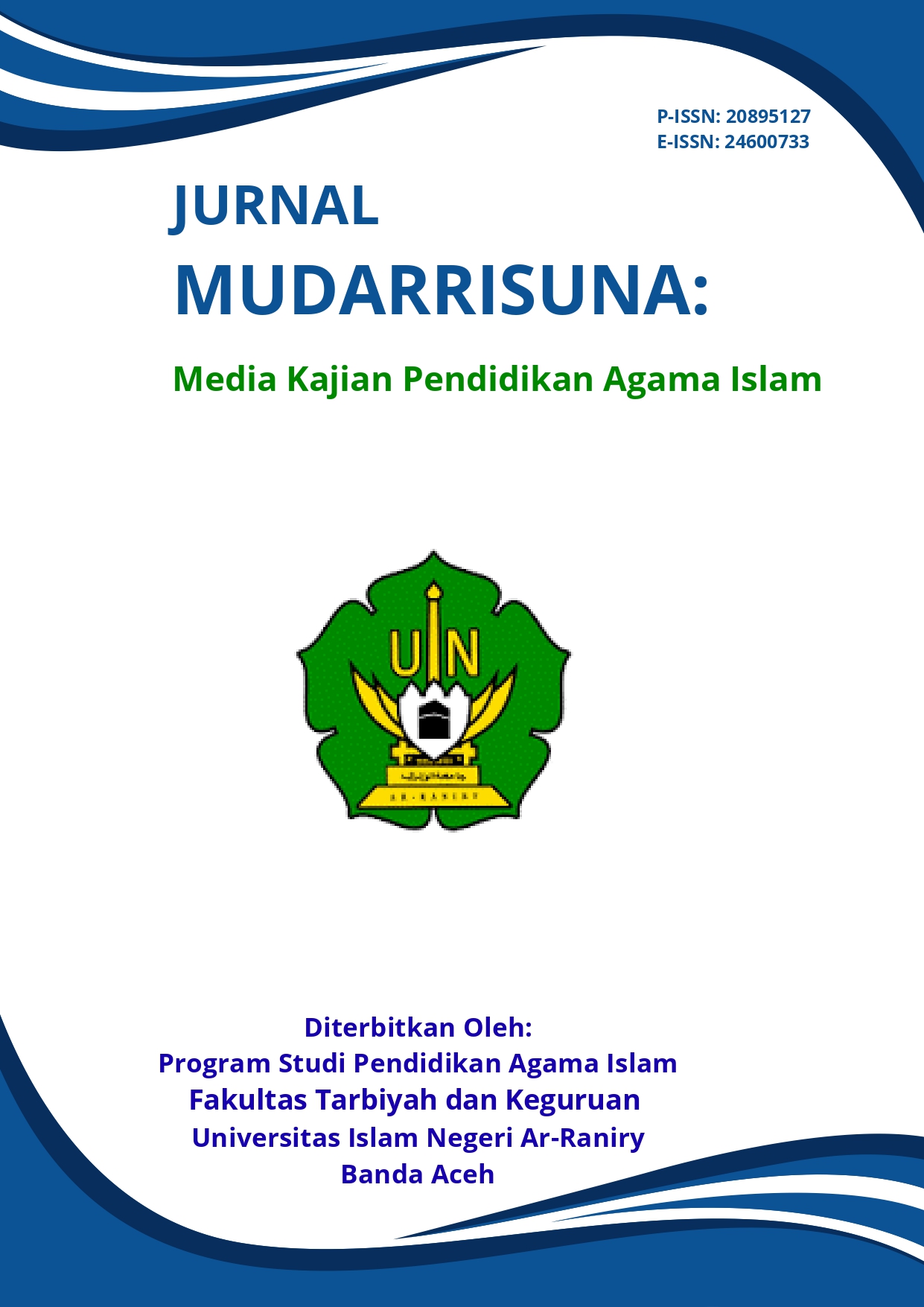Integrating Role Play in Islamic Education for Character Value and Cognitive Achievement in Preschool Learners
DOI:
https://doi.org/10.22373/jm.v15i1.24734Keywords:
Innovative Approach, Role Play, Preschool Learners, Character Education.Abstract
This research investigates the integration of role play in teaching Hadith to strengthen the character development of preschool learners. The study examines how role-playing activities can enhance the understanding of Islamic principles and the application of Hadith in real-life situations among preschool learners. Employing a quantitative experimental design, the study assesses the impact of incorporating role play into Islamic Studies on the character development of preschool learners at Paud IT Al Mansyur in Kotabaru Regency, South Kalimantan. The experiment involved two groups of preschool learners, each consisting of 10 participants. The experimental group engaged in role-playing scenarios designed to teach Hadith and key Islamic values such as self-esteem, empathy, honesty, love, affection, and social responsibility. The control group followed traditional teaching methods. Pre- and post-intervention assessments measured improvements in character traits. The results indicated that the experimental group showed significant improvement in character development compared to the control group. These findings suggest that integrating role play into Islamic Studies, particularly in teaching Hadith to preschoolers, is an effective pedagogical strategy for fostering holistic development, blending moral education with cognitive achievement in a synergistic manner.
References
Arsyad, A. (2013). Pendidikan Karakter: Al-Qaulu Al-Qadim wa Al-Qaulu Al-Hadits. Al-Ulum, 13(1), 39-72.
Brown, H. D. (2007). Principles of Language Learning and Teaching. Pearson Education.
Creswell, John W.(2012) An Introduction to Educational Research. Fourth Edition. Boston:Pearson
Elihami, SM (2021). Early Childhood Education with an Islamic Religious Education Approach in the Era of Community Challenges 5.0. Holistic Intergrative PAUD National Seminar, 97-102
Guilfoyle, A., & Mistry, M. (2013). Role play: An effective technique for learning and teaching speaking and listening skills. Journal of Educational Psychology and Research, 15 (2), 115-127.
Huda, N., Dahliana, D., & Aseri, A. F. (2023). Improving the quality of prophetic intelligence-based moral education programs with the CIPP model. Eurasian Journal of Educational Research, 107, 1-16. https://doi.org/10.14689/ejer.2023.107.001
irlina, A (2016) The Implementation of Islamic Education at Integrated Islamic Preschool Learners Al Mansyu Kotabaru Regency. Scientific Journal of Religion, Education and Society vol 7 no 12 p.97-116
Irlina, A. (2019). Teaching the Holy Quran to young learners (7-12 years old). *l-Adzka: Jurnal Ilmiah Pendidikan Guru Madrasah Ibtidaiyah, 9*(1), 21-26. https://jurnal.uin-antasari.ac.id/index.php/adzka
Irlina, A. (2021). BUILDING A COUNTRY IN THE ERA OF COVID-19 PANDEMIC IN ISLAMIC PERSPECTIVE (PROBLEMS AND THE SOLUTIONS FOR EDUCATIONAL SYSTEM DURING THE COVID-19 PANDEMIC). "Islam and Sountheast Asian Communities Welfare in the COVID-19 ERA", 101-121.
Irlina, A. (2023) Strengthening Young Generation Character with Islamic Education from Preschool in 5.0 Society. Journal of Humanities and Social Sciences Innovation, Vol. 3 No. 1.
Irwansyah, D. (2023). Teaching English to young Moslem learners: Lessons learned from an expanding circle country. JOLLT Journal of Languages and Language Teaching, 11(2), 355-362. https://doi.org/10.33394/jollt.v11i2.7192
Ishak, N. M., & Aziz, M. N. A. (2022). Enhancing communicative competence through role play: Insights from ESL classrooms. International Journal of Language Learning, 8(4), 234-250.
Krashen, S. (1985). The Input Hypothesis: Issues and Implications. Longman.
Madayani, N. S., Soengkono, N., & Adibah, L. (2019). Practices of teaching English to young learners: Voices from Islamic primary schools. IJOTL-TL, 4(2), 117-144. https://doi.org/10.30957/ijotl-tl.v4i2.610
Neupane, D. (2019). Role play as a strategy to enhance speaking skills: An analysis of EFL learners in Nepal. *Journal of Educational Research and Reviews, (3), 81-92.
Negara, E. D. (2021). Integrating role play in character education: A study in Islamic preschools. Journal of Early Childhood Education Research, 10(1), 45-58.
Raz, A. (1985). The impact of role-playing on the development of English language skills. Language Teaching Research, 3(2), 65-78.
Here is the bibliography entry in APA style:
Tim Mutu JSIT Indonesia. (2017). Standar Mutu Kekhasan Sekolah Islam Terpadu (Edisi keempat). Jakarta, Indonesia.
Vygotsky, L. S. (1978). Mind in Society: The Development of Higher Psychological Processes. Harvard University Press.
Here's the reference formatted in APA style:
Wahyuni, A., & Musayyadah. (2024). Implementation of a role-playing central learning model in the formation of children's character at the age of 4-5 years. *Journal of Early Childhood Education*, 4(1), 25-34. https://doi.org/10.14421/joyced.2024.41-03
Zuraina, A. (2019, September 17). Investigating the implementation of English-Huffaz Program for preschools. Blue Eyes Intelligence Engineering & Sciences Publication. Retrieved from oai:umpir.ump.edu.my:25951
Downloads
Published
Issue
Section
License
Jurnal MUDARRISUNA: Media Kajian Pendidikan Agama Islam allows the author(s) to hold the copyright and to retain the publishing rights without restrictions. Authors who publish in this journal agree to the following terms:
- Authors retain copyright and grant the journal right of first publication with the work simultaneously licensed under a Creative Commons Attribution-ShareAlike 4.0 International License that allows others to share the work with an acknowledgment of the work's authorship and initial publication in this journal.
- Authors are able to enter into separate, additional contractual arrangements for the non-exclusive distribution of the journal's published version of the work (e.g., post it to an institutional repository or publish it in a book), with an acknowledgment of its initial publication in this journal.
- Authors are permitted and encouraged to post their work online (e.g., in institutional repositories or on their website) prior to and during the submission process, as it can lead to productive exchanges, as well as earlier and greater citation of published work.




